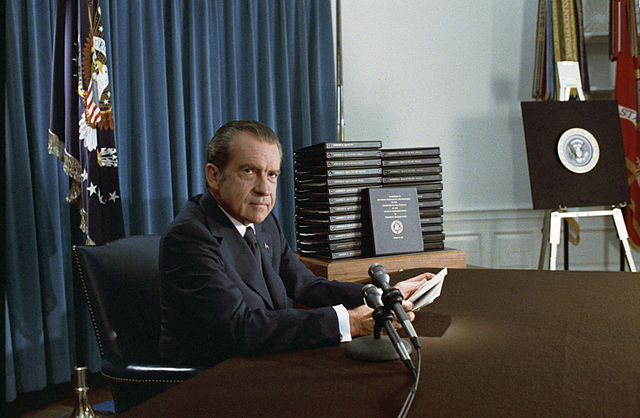A glitter of generals?
by Tom Sullivan

Marine Lt. Gen. James N. Mattis, testifies before the Committee on Armed Services during his confirmation hearing for appointment to Commander, United States Joint Forces Command and Supreme Allied Commander for Transformation. U.S. Navy photo, 2007.
To hear it told, having retired four-star general James Mattis heading the Defense Department for Donald Trump might be one way to “reign in” (pun intended) Trump’s impulsiveness. Fred Kaplan writes at Slate about Mattis’ Senate confirmation hearings:
To many Trump skeptics, this has always been Mattis’ main appeal—that his street cred as a retired four-star Marine general and a noted scholar of history and strategy would serve as restraining influence to Trump’s unpredictability and to the extreme belligerence of the president-elect’s national security adviser, retired Lt. Gen. Michael Flynn.
A normally wary Senate even issued a waiver to a law preventing retired generals from serving as defense secretary until seven years after retirement. Mattis has only clocked four.
Sen. John McCain, the committee’s chairman, cited testimony from earlier this week by two scholars on civil-military relations who strongly supported the law barring recently retired officers from taking the job but also strongly supported making an exception for Mattis. One of those scholars, Eliot Cohen, a noted author and professor, former State Department official, and, during the presidential campaign, an instigator of the “Never Trump” movement launched by conservative national-security specialists, said at this earlier hearing that Mattis “would be a stabilizing and moderating force, preventing wildly stupid, dangerous, or illegal things from happening.”
Considering what David Ignatius reveals in his post this morning regarding Flynn, Mattis might be the right guy for the job. Ignatius wonders what the Trump team’s connections with Russia might mean for future relations:
According to a senior U.S. government official, Flynn phoned Russian Ambassador Sergey Kislyak several times on Dec. 29, the day the Obama administration announced the expulsion of 35 Russian officials as well as other measures in retaliation for the hacking. What did Flynn say, and did it undercut the U.S. sanctions? The Logan Act (though never enforced) bars U.S. citizens from correspondence intending to influence a foreign government about “disputes” with the United States. Was its spirit violated? The Trump campaign didn’t immediately respond to a request for comment.
If the Trump team’s contacts helped discourage the Russians from a counter-retaliation, maybe that’s a good thing. But we ought to know the facts.
Uh, yeah.
Sen. Elizabeth Warren might have been wondering about that too. John Cassidy writes at the New Yorker that Warren asked Mattis if he believed in offering frank advice and if that belief extended to the President’s other national-security advisers:
“Absolutely, Senator,” he said, in response to Warren’s question. “And I would not have taken this nomination if I didn’t have this belief.”
“Good,” Warren said. “And what about the President himself? Under what circumstances will you advocate for your views forcefully and frankly?”
“On every circumstance, Senator,” Mattis said, slowly and deliberately.
Trump has named so many generals to his team I had to look up the collective noun: a glitter of generals. With Flynn as national security advisor and Mattis as as secretary of defense, it seems what the Senate is hoping for instead is a clash of generals.











